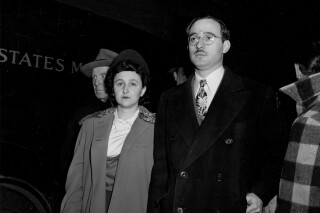Today in History: April 5, Julius and Ethel Rosenberg are sentenced to death

Julius Rosenberg and his wife, Ethel, arrive at Federal Courthouse for their espionage trial in New York City on March 21, 1951. The Rosenbergs, tried under the Espionage Act of 1917, are two of three defendants charged with conspiracy to spy for the Soviet Union. (AP Photo)
Today in History:
On April 5, 1951, Julius and Ethel Rosenberg were sentenced to death following their conviction in New York on charges of conspiring to commit espionage for the Soviet Union.
On this date:
In 1614, Indian Chief Powhatan’s daughter Pocahontas married Englishman John Rolfe, a widower, in the Virginia Colony.
In 1621, the Mayflower sailed from Plymouth Colony in present-day Massachusetts on a monthlong return trip to England.
In 1764, Britain’s Parliament passed The American Revenue Act of 1764, also known as the Sugar Act.
In 1887, in Tuscumbia, Alabama, teacher Anne Sullivan achieved a breakthrough as her 6-year-old deaf-blind pupil, Helen Keller, learned the meaning of the word “water” as spelled out in the Manual Alphabet.
In 1976, reclusive billionaire Howard Hughes died in Houston at age 70.
In 1986, two American servicemen and a Turkish woman were killed in the bombing of a West Berlin discotheque, an incident that prompted a U.S. air raid on Libya more than a week later.
In 1987, Fox Broadcasting Co. made its prime-time TV debut by airing the situation comedy “Married with Children” followed by “The Tracey Ullman Show,” then repeating both premiere episodes two more times in the same evening.
In 1991, former Sen. John Tower, R-Texas, his daughter Marian and 21 other people were killed in a commuter plane crash near Brunswick, Georgia.
In 2008, actor Charlton Heston, big-screen hero and later leader of the National Rifle Association, died in Beverly Hills, California, at age 84.
In 2010, an explosion at the Upper Big Branch mine near Charleston, West Virginia, killed 29 workers. In a televised rescue, 115 Chinese coal miners were freed after spending eight days trapped in a flooded mine, surviving an accident that had killed 38.
In 2016, UConn won an unprecedented fourth straight women’s national championship, capping another perfect season by routing Syracuse 82-51.
In 2018, in his first public comments about Stormy Daniels, President Donald Trump said he didn’t know about the $130,000 payment his personal attorney Michael Cohen had made to the porn actress who alleged she had an affair with Trump.
In 2019, inspecting a refurbished section of fencing at the Mexican border in California, President Donald Trump declared that “our country is full,” and that illegal crossings must be stopped.
In 2021, the Minneapolis police chief testified that former officer Derek Chauvin had violated departmental policy in pressing his knee against George Floyd’s neck and keeping Floyd down after he had stopped breathing; the testimony came on the sixth day of Chauvin’s murder trial. (Chauvin would be convicted of murder and manslaughter.)
In 2022, Ukrainian President Volodymyr Zelenskyy accused Russian troops of gruesome atrocities in Ukraine and told the U.N. Security Council that those responsible should immediately be brought up on war crimes charges in front of a tribunal like the one set up at Nuremberg after World War II.
In 2023, Democrat Robert F. Kennedy Jr., an anti-vaccine activist and scion of one of the country’s most famous political families, announced he was running for president.
